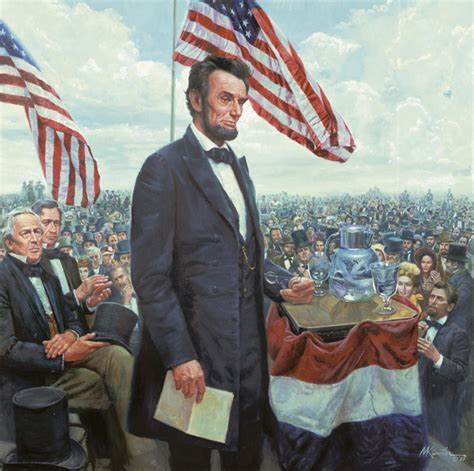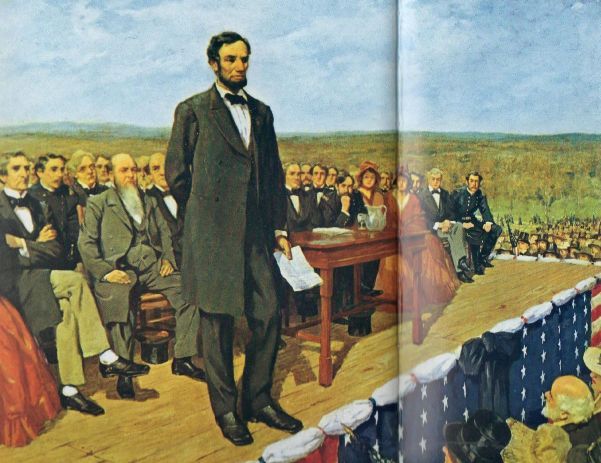Historical Context
The “Lost Speech” of Abraham Lincoln refers to an impassioned address delivered on May 29, 1856, at the Illinois State Republican Convention in Bloomington. This moment marked a pivotal point in Lincoln’s political career and the nascent Republican Party’s emergence as a force opposing the expansion of slavery in the United States.
In the mid-1850s, America was embroiled in fierce debates over slavery, particularly in newly acquired territories. The Kansas-Nebraska Act of 1854 had reignited tensions, allowing settlers in those territories to determine whether they would permit slavery. This political turmoil set the stage for Lincoln’s speech, which came at a time when the Republican Party was attempting to unify various factions against the Democrats and the pro-slavery establishment.
The Speech: A Moment of Eloquence

While the full text of Lincoln’s Lost Speech was never transcribed, contemporary accounts suggest that it was a powerful and articulate defense of the principles that underpinned the Republican Party. Lincoln spoke against the expansion of slavery and advocated for a government that served all its citizens, regardless of race. His words were said to be both passionate and deeply resonant, articulating a moral stance that appealed to many attendees at the convention.
According to those who were present, Lincoln’s speech was marked by a sense of urgency and conviction. Witnesses described how he emphasized the moral imperative to oppose the spread of slavery, framing the issue as one that transcended party politics and tapped into fundamental human rights.
The Aftermath: A Speech Lost to Time
The Lost Speech gained its name because, despite its significance, no complete record of it exists. Various newspaper accounts attempted to summarize Lincoln’s remarks, but these summaries were inconsistent and often incomplete. The speech’s elusiveness only added to its mystique, capturing the imagination of historians and scholars.
In the years following the speech, Lincoln’s prominence within the Republican Party grew, culminating in his nomination for the presidency in 1860. However, the Lost Speech remained a tantalizing enigma, representing a missed opportunity for a complete understanding of Lincoln’s evolving political philosophy at a critical juncture in American history.
Legacy and Significance
The significance of the Lost Speech extends beyond its content. It symbolizes Lincoln’s emergence as a national leader and a champion of the anti-slavery cause. The speech underscored the ideological battles of the time, encapsulating the struggle between freedom and oppression that would ultimately lead to the Civil War.
Scholars have often speculated about the impact of the Lost Speech on Lincoln’s development as a political figure. Some argue that it marked a turning point, showcasing his ability to articulate complex ideas with clarity and passion. Others see it as a reflection of his deepening commitment to the abolitionist movement, setting the stage for his later policies and speeches, including the Emancipation Proclamation.
Rediscovery Efforts
Over the years, historians have sought to piece together the Lost Speech through various accounts and recollections from those who were present. Notably, in 1886, a prominent journalist named Joseph Medill published a partial version of the speech based on his recollections and the memories of other attendees. This version, while not complete, offered valuable insights into Lincoln’s arguments and the political climate of the time.
Modern historians have continued to explore the implications of the Lost Speech, examining its themes and messages within the broader context of American history. The speech has been referenced in discussions about Lincoln’s political ideology and the moral dilemmas of his time.
Conclusion
The Lost Speech of Abraham Lincoln remains a poignant reminder of the complexities of political discourse in a divided nation. Though its words have faded into obscurity, the themes it embodied—justice, equality, and the struggle against oppression—resonate powerfully in contemporary discussions about civil rights and social justice. As scholars continue to investigate this significant moment in history, the Lost Speech endures as a symbol of Lincoln’s enduring legacy and the ideals of a nation striving for unity and equality.



Üsküdar su tesisatı onarımı Üsküdar da lavabo tıkanıklığı için bu firmayı tercih etmemiz doğru bir karar oldu. Profesyonel ekip, sorunumuzu anında çözdü ve gereksiz masraflardan kaçınmamıza yardımcı oldu.Teşekkürler! https://sabaylok.com/blogs/13036/%C3%9Csk%C3%BCdar-WC-T%C4%B1kan%C4%B1kl%C4%B1%C4%9F%C4%B1-A%C3%A7ma
Malatya uydu ayarı Uyducu Malatya profesyonel hizmet anlayışıyla çok güven veriyor. https://sngine.linyway.com/blogs/5148/Uyducu-Malatya